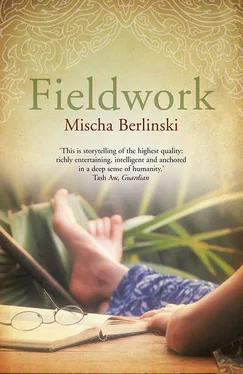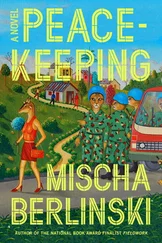Karen told Martiya about all the people they had known in graduate school and where they all had ended up: Mike Pendleton was at Brown with tenure, and Sarah Lutz wrote a great paper on the Sigoni, really interesting stuff, she's a big talent, too bad about the acne, and that weird guy who did pre-Columbian? Who chewed with his mouth open and left those gross notes for Karen in her mailbox? Harvard. Yup. So unfair. Then Karen told Martiya all about Ted, and Martiya listened with her head cocked at a feline, feminine angle, so attentive you'd think she had spent the last few years here in the mountains just asking herself, over and over again, "And gosh, how are things going between Karen and Ted?"
"I never liked Ted that much, to tell you the truth," Martiya finally said.
"Really?" Karen had always thought that everyone liked Ted. That was one of the things that she had liked about Ted, the way everyone liked him.
"There was something … something too clever about the guy, like he was trying to get away with something."
"That's it. That's it exactly ," said Karen.
"And remember that business with the tipping? At restaurants?"
"My God, that used to drive me nuts. That little plastic thing he had in his wallet to work out the percentages. I got so embarrassed when he took that thing out."
"And he had such shifty little eyes."
Martiya made such a dead-on imitation of Ted's beady little eyes sliding back and forth that Karen started to giggle, and when Martiya started to imitate the way Ted's fishy one-size-too-small mouth twitched, Karen started to laugh. Then a few seconds later, when Karen started to cry, Martiya gave her a big hug and stroked her hair, and said, "It's okay, Kit-Kat. It'll be okay."
Can you believe , Karen asked me, that this woman would spend the last ten years of her life in jail, for murder ?
Murder! Karen paused dramatically on the word. I jumped at the unaccustomed pause in the conversation.
"Karen, hang on one sec — there's something I'm not understanding here — something I just don't get."
"Shoot," said Karen.
"You went off to visit Martiya in …" I checked my notes. "In 1982."
"Eighty-three."
"Eighty-three." I corrected my notes. "But Martiya left the village— she was done with her fieldwork — in 1977. She went back to California."
"Uh-huh."
"Okay, all that I understand. Here's the thing I don't understand. You told me that a year and a half, two years later, she came back to Thailand. That would be … 1979 or so."
"That's right."
"So the thing I don't get is — why did she come back to Thailand?"
The question was not spontaneous. I had written it down on a Post-it note and attached it to the telephone in anticipation of Karen's call. I had thought about this a lot. I knew that Martiya spent two and a half years in a Dyalo village, and returned to Berkeley in 1977; and I knew that after eighteen months back home, Martiya decided to return to Thailand and live in a Dyalo village . As courageous as the decision may have been, it was also very unusual: Martiya was, by all accounts, a smart, ambitious student, a leader in one of the very finest doctoral programs in the world. Her thesis adviser was the legendary Joseph Atkinson. And at an age — thirty-one — when pressures to succeed and form a life and make a place for oneself in the world are not inconsiderable, Martiya decided that her life, her real life, the place where she wanted to be, was a tribal village in the north of Thailand. She was no longer interested in being an academic: she returned to the village no longer under the aegis of the Anthropology Department. The government no longer covered her expenses. Joseph Atkinson specifically advised her not to go. And this time, she went without a return ticket. So I wondered: Why did she go back?
Well , Karen said, redirecting the great eighteen-wheeler that was her conversation, she had asked herself the same thing. And this was her take on the situation.
Everyone in anthro knows it, it's an open secret, but coming home from the field is as tough as going out. Maybe even tougher. When you go out on the road, you're you; and when you come back, you're not you anymore, but they're still them. You get off of that plane thinking that the world is a big strange place and your brain is just churning, trying to figure it out, and even if the place where you're coming back to is the Department of Anthropology , your brain is still churning faster than everyone else's. It's like a chainsaw hitting a steel spike.
It had been hard for Karen coming home from the Philippines, but one thing had made it easier: Ted. She had met Ted just two days after she got back to Berkeley, and being swept-off-your-feet, can-I-possibly-get-enough-of-this-man madly in love — especially in love with someone like Ted, who knew how to love a woman, she had to say that about Ted, he did know how to love a woman, except that he didn't seem to know how to love just one woman — it was like somebody had turned up life's intensity meter all the way to maximum. Ted had listened to Karen talk about the Philippines for hours and hours, the two of them lying naked on Ted's bed, and Karen had to admit it, although she hated to, Ted had been a good listener. Christ, Ted was so goddamn smart, that was the thing: Ted had just homed in straightaway on what made her village hers , and how it worked, and what was interesting anthropologically, and what was interesting humanly, and after spending ten straight days in bed talking with Ted, it was like Ted had been there with her.
But Martiya didn't have Ted — and although not having Ted could only be considered a blessing in a woman's life, sometimes Karen wondered whether Martiya would have ended up Martiya the Tragic Murderess, if Martiya the Frustrated Grad Student and not Karen had sat next to Ted that day in the library. Because for Martiya, the hardest thing about coming home was that when she finally got back to California, after almost two and a half years in Dan Loi, nobody seemed much interested in the Dyalo at all. This was a keen irony, because after two and a half years complaining to Karen in letter after letter that she was bored, as soon as she left that village, she could think of nothing else.
She had figured that, at the very least, the other anthropologists in the department would want to ask her a million questions, but most colleagues just used her return as an excuse to tell stories about their experiences in the field — and those stories, unlike her own, were very boring.
Joseph Atkinson gave Martiya exactly three hours of solid, serious attention. He invited her out for dinner a week or so after she got back, and took her to a good restaurant in San Francisco, some place with flickering little rainbows on the very white tablecloth where the candle-light refracted through the heavy crystal. The food struck Martiya as tasteless, after Dyalo food, and a little heavy, but she didn't complain: at least Atkinson was giving her the chance to tell Dyalo stories. Martiya knew she wasn't conversing, she was delivering a monologue, but she had wanted to tell someone all this stuff for such a long time. She talked about the huge New Year's feasts, when the village exploded in dancing for three days, with wild drumbeats all through the night, and the complicated games by which the Dyalo young men paid court to the Dyalo maidens; and she told him how thrilling it was when, after almost two years, she could finally start to understand Dyalo poetry. When old Sings Soft had recited Dyalo love poems on a warm summer night under a full moon with all the village crouching low, not daring to breathe or even sigh, she had cried. She had seen Dyalo children born and Dyalo die, and they had started coming to her, of all people, for medical advice. She had so many more stories to tell, too, about the Yunnanese opium traders who came on muleback, and the flash that came when Martiya finally figured out the east-west/life-death/sunrise-sunset symbolic system that— well, it pretty much organized everything —and the time that the shaman who looked like George Washington exorcised her when she had this persistent headache, and damned if she didn't get better right away. But then she and Atkinson had dessert and coffee, and although Martiya would have liked to talk more, Atkinson took her home, and from that point on, whenever Martiya tried to tell a Dyalo story, Atkinson just said, "Save it for the thesis, kiddo."
Читать дальше












